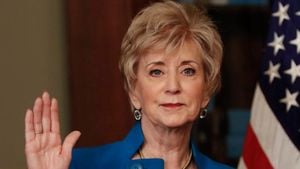Book censorship has intensified across the U.S. as various regions grapple with LGBTQ+ literature being removed from schools and libraries. This controversial trend is raising alarms among advocates for diversity and inclusion, who argue it could undermine students' rights to access diverse perspectives.
Recently, the Ozark Public Library in Alabama found itself at the center of this debate. Library staff spent four weeks reviewing 8,000 children's and young adult titles to comply with stringent state guidelines from the Alabama Public Library Service.
During this closure, library director Karen Speck expressed the mental toll the review process took on her staff. "My eyes hurt. My head hurts. My brain is tired of looking through books," she admitted.
The move to pull books and review their content stems from Governor Kay Ivey's mandate aimed at ensuring libraries do not include materials deemed "inappropriate" for minors. Many surrounding libraries were similarly pressured, leading to heated community meetings packed with supporters and opponents of LGBTQ+ literature.
Mayor Mark Blankenship of Ozark explicitly called for the removal of all LGBTQ books, setting off intense debates. Local meetings reflected the stark divides as residents publicly clashed over what they considered suitable content for children.
The trend toward increased scrutiny of library books is not limited to Alabama. Reports indicate more schools across the UK are following suit, with complaints from parents resulting in the removal of numerous LGBTQ-themed books.
A recent study highlighted this filtering process, showing the extent to which schools are succumbing to pressure from vocal parents. Majority of these complaints center on literature featuring LGBTQ characters and narratives, raising concerns about the visibility of these identities.
Further concerns were raised in the UK over parental complaints directly translating to fewer available titles. The fight goes beyond mere titles; it emphasizes the broader cultural battle over representation and identity.
Despite the contentious atmosphere, many librarians argue the necessity of diversity within literature. Inclusivity is seen as pivotal for reflecting all facets of society, underscoring the importance of allowing young people to explore varied life experiences through books.
Simultaneously, many students and activists are vocalizing their discontent with these bans. They assert these literary works provide solace, validation, and representation previously lacking within their educational systems.
Even as political battles over LGBTQ+ literature rage on, advocates remind us of the importance of books as tools for discussion and introspection. The ability to navigate complex feelings related to identity is often scaffolded by access to literature.
Back at the Ozark library, upon reviewing the targeted 8,000 books, it turned out not one contained the objectionable content officials feared. Yet, the emotional aftermath has left staff weary and community members divided.
Speck shared how staff engaged with the community during this tumultuous period: "Some people are not happy because they do rely on the library. Then there are others who feel bad we have to go through this process." She remains committed to ensuring transparency and accountability within the library.
The difficulties faced by the staff resonate with many librarians across the country. They often find themselves at the crossroads of upholding community standards against the fundamental right to access diverse narratives.
Advocacy groups have mobilized to rally for the rights of students to receive literature reflective of their realities. Students argue these books can provide them with comfort and insight, aiding them as they navigate their formative years.
According to the American Library Association, approximately 1,500 unique titles were challenged or banned across the nation between 2022 and 2023. Among these, LGBTQ+ literature has often been disproportionately targeted.
More alarming is the ripple effect these bans could cause. If literary works remain inaccessible, future generations risk losing out on important discussions surrounding acceptance and identity.
Libraries have historically served as safe havens of knowledge and exploration, allowing individuals to question societal norms. Many educators and advocates stress the need for libraries to protect this role, ensuring the freedom to read remains intact.
Back at the local level, as the Ozark Public Library prepares to reopen and welcome patrons back, Speck looks to the future with renewed determination. “I miss our people, our patrons,” she said, expressing hope for support from her community.
Yet, as the library resumes operations, the echoes of the past controversies continue to linger. Community members must now reckon with what these restrictions mean for their future generations.
Meanwhile, similar trends are surfacing across various states and districts as parents and policymakers address curriculum content. The importance of books reflecting all life experiences becomes clearer as educators aim to understand and respond to their diverse student populations.
For many lawmakers, censorship of any kind remains contentious. The ramifications of book bans not only affect accessibility but also open up larger discussions surrounding educational resources and funding.
Communities must weigh their values against the potential silencing of voices and stories. The tension could either lead to greater unity or deepen divisions, depending on how each community chooses to move forward.
With the increasing visibility of LGBTQ+ issues worldwide, advocates hope communities will choose acceptance and inclusivity over exclusion. The future may hinge on recognizing the need for diverse narratives, ensuring all students feel represented.
Perhaps as students return to classrooms and libraries bring back their collections, the question arises—what narrative will educators choose to uphold? The coming months may very well define the direction of educational policy and community values going forward.



